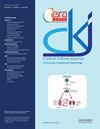Point-of-care ultrasound Training in Nephrology: a position statement by the International Alliance for POCUS in Nephrology
IF 3.9
2区 医学
Q1 UROLOGY & NEPHROLOGY
引用次数: 0
Abstract
Point-of-care Ultrasonography (POCUS) has rapidly evolved from a niche technology to an indispensable tool across medical specialties, including nephrology. This evolution is driven by advancements in technology and the visionary efforts of clinicians in emergency medicine and beyond. Recognizing its potential, medical schools are increasingly integrating POCUS into training curricula, emphasizing its role in enhancing diagnostic accuracy and patient care. Despite these advancements, barriers such as limited faculty expertise and standardized guidelines hinder widespread adoption and regulation. The International Alliance for POCUS in Nephrology (IAPN), through this position statement, aims to guide nephrologists in harnessing the diagnostic power of POCUS responsibly and effectively. By outlining core competencies, recommending training modalities, and advocating for robust quality assurance measures, we envision a future where POCUS enhances nephrology practice globally, ensuring optimal patient outcomes through informed, evidence-based decision-making. International collaboration and education are essential to overcome current challenges and realize the full potential of POCUS in nephrology and beyond.肾脏病护理点超声波培训:国际肾脏病护理点超声波联盟立场声明
护理点超声造影 (POCUS) 已从一项小众技术迅速发展成为包括肾脏病学在内的各医学专科不可或缺的工具。技术的进步和急诊医学及其他领域临床医生的远见卓识推动了这一发展。医学院认识到了 POCUS 的潜力,正越来越多地将其纳入培训课程,强调其在提高诊断准确性和患者护理方面的作用。尽管取得了这些进步,但师资力量和标准化指南有限等障碍阻碍了其广泛应用和规范。国际肾脏病学 POCUS 联盟 (IAPN) 通过本立场声明,旨在指导肾脏病学家负责任地、有效地利用 POCUS 的诊断能力。通过概述核心能力、推荐培训模式和倡导强有力的质量保证措施,我们展望未来,POCUS 将在全球范围内提高肾脏病学的实践水平,通过知情、循证的决策确保患者获得最佳治疗效果。国际合作和教育对于克服当前的挑战并充分发挥 POCUS 在肾脏病学及其他领域的潜力至关重要。
本文章由计算机程序翻译,如有差异,请以英文原文为准。
求助全文
约1分钟内获得全文
求助全文
来源期刊

Clinical Kidney Journal
Medicine-Transplantation
CiteScore
6.70
自引率
10.90%
发文量
242
审稿时长
8 weeks
期刊介绍:
About the Journal
Clinical Kidney Journal: Clinical and Translational Nephrology (ckj), an official journal of the ERA-EDTA (European Renal Association-European Dialysis and Transplant Association), is a fully open access, online only journal publishing bimonthly. The journal is an essential educational and training resource integrating clinical, translational and educational research into clinical practice. ckj aims to contribute to a translational research culture among nephrologists and kidney pathologists that helps close the gap between basic researchers and practicing clinicians and promote sorely needed innovation in the Nephrology field. All research articles in this journal have undergone peer review.
 求助内容:
求助内容: 应助结果提醒方式:
应助结果提醒方式:


